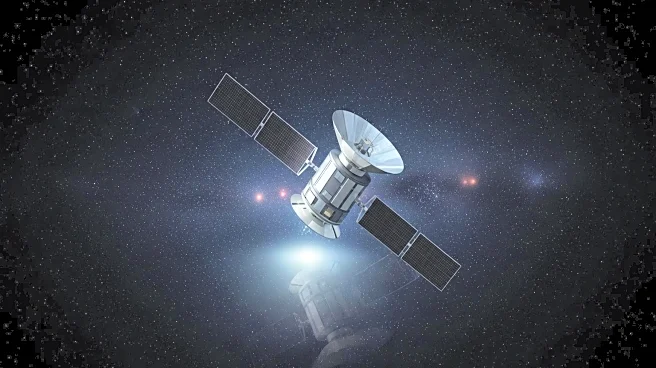What is the story about?
What's Happening?
Reflect Orbital, a California-based startup, has proposed launching thousands of satellites equipped with mirrors to redirect sunlight to solar farms at night. The company has requested a license from the Federal Communications Commission to launch a demonstration satellite in 2026, with plans to expand to approximately 4,000 satellites by 2030. This initiative aims to extend the operational hours of solar farms, but has raised concerns among astronomers. The redirected light, comparable to the brightness of a full moon, could disrupt astronomical research by illuminating the night sky. Reflect Orbital has pledged to avoid reflecting light near observatories and to share satellite positions with scientists to mitigate potential impacts.
Why It's Important?
The plan by Reflect Orbital could significantly impact ground-based optical astronomy, as the artificial illumination may interfere with sensitive astronomical equipment. This development highlights the growing tension between technological advancements in renewable energy and the preservation of dark skies essential for astronomical research. The initiative also raises environmental concerns, as artificial light at night can disrupt nocturnal wildlife and ecosystems. While the startup aims to contribute to clean energy solutions, the environmental impact of satellite launches and light pollution could offset potential benefits. The situation underscores the need for careful consideration of technological impacts on scientific research and environmental health.
What's Next?
Reflect Orbital's proposal is pending approval from the Federal Communications Commission, which has yet to comment on the matter. The startup plans to conduct a demonstration next year to refine its satellite design and assess environmental impacts. The astronomical community continues to voice concerns, urging policymakers to consider the implications on research. Reflect Orbital is working with scientists to address these issues, but the effectiveness of proposed countermeasures remains uncertain. The outcome of the FCC's decision will determine the future trajectory of this initiative and its impact on both renewable energy and astronomy.
Beyond the Headlines
The broader implications of Reflect Orbital's plan extend beyond astronomy, touching on ethical considerations regarding the alteration of natural environments. The initiative raises questions about the balance between technological progress and the preservation of natural phenomena. As satellite constellations become more prevalent, the cumulative effects on the night sky and ecosystems could lead to long-term shifts in environmental policy and scientific research priorities. This development may prompt discussions on the regulation of satellite launches and the protection of dark skies as a shared global resource.
















